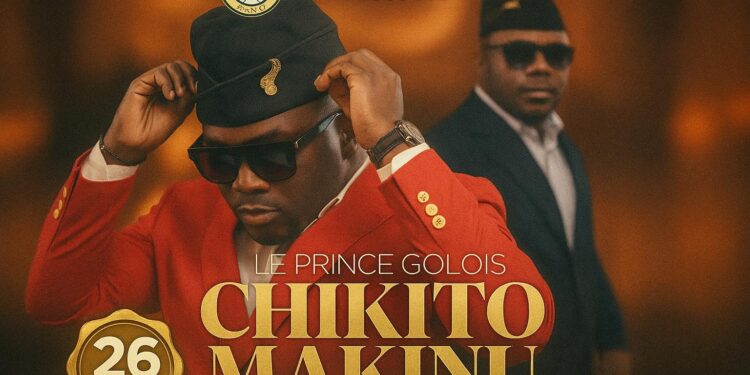Rumba as Congolese Soft Power
Few art forms carry the symbolic heft that rumba enjoys on the banks of the Congo River. Recognised by UNESCO as Intangible Cultural Heritage in 2021 (UNESCO 2021), the genre is today mobilised by Brazzaville’s authorities as a tool of soft power, an audible emblem of national continuity amid regional flux. The forthcoming appearance of Chikito Makinu on 26 July at the Espace Exo-Bus is therefore more than an evening’s entertainment; it is a calibrated gesture in the larger narrative of cultural nation-branding.
An Heir to Ferré Gola’s Legacy
Makinu’s sobriquet, “Le Prince Golois,” makes explicit his artistic lineage. Ferré Gola’s lyricism and sartorial elegance have long provided a blueprint for aspiring interpreters of modern rumba, and Makinu consciously positions himself within that lineage. Early digital singles such as “Symphonie d’un Cœur” and “Rue Moukondo” display vocal agility and harmonic layering reminiscent of his mentor, yet critics note a brisker rhythmic undercurrent that signals generational evolution. According to commentators at Radio Congo (Radio Congo, May 2024), the young crooner’s command of stagecraft has already drawn diplomatic audiences in Kinshasa and Pointe-Noire, confirming his suitability as an unofficial cultural envoy.
July 26 Concert and the Urban Fabric of Brazzaville
The choice of Espace Exo-Bus, a repurposed industrial venue overlooking the Djoué tributary, underscores the city’s broader urban-renewal agenda. Since 2022 the municipal council has encouraged private cultural operators to activate disused sites, a strategy that has doubled foot traffic in the Poto-Poto arts district (Municipalité de Brazzaville, 2023). Makinu’s concert is expected to draw an audience exceeding 2,500, a figure that local hoteliers regard as a welcome mid-dry-season boost. In conversations with this publication, venue director Élise Okemba anticipates an occupancy rate of “nearly full capacity, with a notable influx of visitors from Kinshasa via the new nightly ferry link,” further validating the cross-river cultural corridor envisaged by both governments.
Cultural Governance and Public Diplomacy
The Ministry of Culture’s discreet support for the event aligns with Brazzaville’s diplomatic messaging at multilateral fora, where officials underscore the stabilising role of cultural industries. By elevating rumba’s youthful exponents, policymakers seek to amplify narratives of creative resilience that counterbalance coverage of security or economic headwinds. In a recent press briefing, Minister Lydie Pongault emphasised that “the arts sector illustrates our capacity for concord and innovation,” a statement echoed in the concert’s promotional material. International partners, including the Francophonie organisation, have signalled interest in future collaboration, seeing in Congolese rumba a connective tissue across the French-speaking world (OIF, 2024).
Economic Ripples of a Musical Evening
Beyond symbolism, the 26 July engagement carries tangible economic stakes. Ticket tiers ranging from 10,000 to 50,000 FCFA suggest gross receipts that could surpass 60 million FCFA, funds that feed a domestic value chain of sound engineers, costume designers and digital marketers. The Congolese Agency for the Promotion of Entrepreneurship projects that every 1,000 concertgoers generate an estimated 7 temporary jobs (Agence Congolaise d’Information, 2023). Such figures bolster the government’s cultural-economy roadmap unveiled last December, which aims to raise the creative sector’s contribution to GDP from 2.3% to 4% by 2027.
A Generation Bridging Heritage and Innovation
Makinu’s appeal resonates strongly with urban youth who consume music primarily through streaming platforms. His collaboration with producer Jésus le Guide Suprême 5G+ has yielded arrangements that splice classic sebene guitar lines with minimalist trap-influenced percussion, a synthesis applauded by critics of the pan-African journal Jeune-Afrique (Jeune-Afrique, April 2024). Yet the performer consciously retains ceremonial codas and Lingala turns of phrase that anchor him in tradition. Ethnomusicologist Cécile Boukadi observes that this balance “re-enchants ancestral idioms without surrendering to pastiche,” a dynamic likely to be on full display in Brazzaville.
Prospects for Congolese Cultural Exports
The July showcase thus functions as a micro-laboratory for Congo’s broader bid to internationalise its creative portfolio. Negotiations are reportedly under way for Makinu’s inclusion in an autumn tour of Central African capitals, underwritten by a coalition of regional airlines keen to package musical tourism. Should those plans materialise, the singer could follow in the footsteps of Ferre Gola and Koffi Olomidé, whose continental circuits in the early 2000s contributed to a surge in bilateral cultural agreements. For diplomatic observers, the upcoming performance offers an instructive glimpse into the mechanics of twenty-first-century cultural statecraft, wherein a single evening of rumba can reverberate well beyond the stage, echoing through chambers of commerce and chancelleries alike.











































